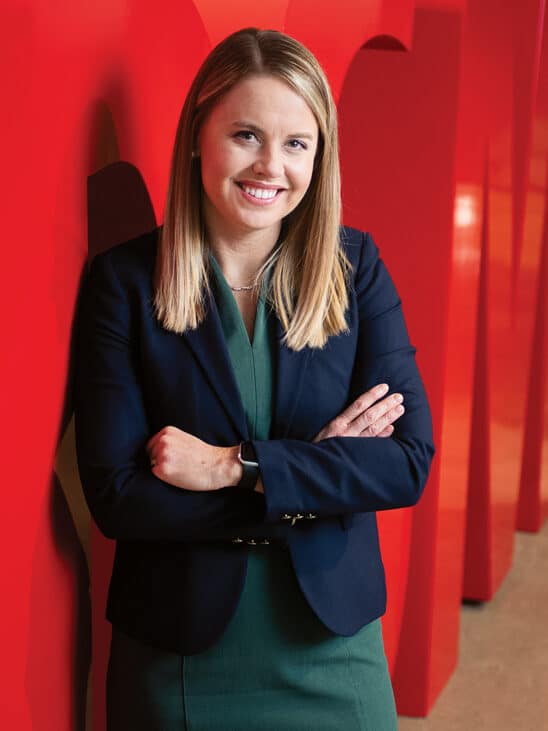Jobs Outlook 2023: Experts share challenges, forecast for 2024 jobs market

Michael Crumb Nov 3, 2023 | 6:00 am
5 min read time
1,284 wordsAll Latest News, Business Record Insider, HR and LeadershipEmployers will have to work to determine their in-office culture and manage their job openings with ongoing labor challenges in 2024, according to employment experts who participated in the Business Record’s Jobs Outlook panel discussion held on Oct. 19.
During the event, the Business Record also named Jessica Meisner, vice president of human resources at UnityPoint Health, as the 2023 Dentons Davis Brown Human Resources Professional of the Year.
Panelists participating in the virtual event were David Leto, CEO of Palmer Group; Jenae Sikkink, senior vice president of talent development at the Greater Des Moines Partnership; Almardi Abdalla, vice president of family and workforce programs, Oakridge Neighborhood; Kathy Anderson, division administrator, business engagement at Iowa Workforce Development; and Peter Orazem, professor of economics at Iowa State University.
Panelists shared their perspectives on, among other things, what challenges businesses will face in 2024; what opportunities may exist as companies try to balance vacancies with the continuing labor shortage; what AI might mean for employers in 2024; how continued fears of recession may affect the labor market; and how work-based learning is increasing across Iowa.
Here is some of what they had to say:
Hiring and retention

Abdalla: Hiring and retention will continue to be a challenge moving forward. We’re seeing fewer skilled job candidates and seeing more companies looking to hire skilled workers, so supply and demand are not equal, and this struggle will continue for companies hiring talented individuals. Not only hiring but also retaining talented individuals.
Company culture

Leto: There’s been so much change these past three years, employers and employees going to all at-home [work] to hybrid [work schedules], to companies now trying to figure out their identity and their culture and communicating that to their employers. I think the biggest challenge will be employers not only communicating who they want to be to their current staff, but bringing people in who will fit that mold. I think hiring went so fast, people were bringing people in at record speed and I wonder if they had slowed down and did things differently if they would do it over again.
Effect of ongoing concerns of recession

Orazem: If you have a general slowdown, that’s going to mean the rate of job openings is going to decline. In Iowa, we are hiring fewer people than we were pre-pandemic per month, but we have more openings per month. The problem isn’t that we don’t have enough labor demand. The problem is we don’t have enough labor supply. So you could slow down the rate of new job openings and still not have any increase in the unemployment rate because we’re not filling all the jobs as it stands.
What areas are seeing the greatest demand?
Leto: Just about everything. IT demand is still very strong. We’re seeing huge demand for customer service personnel. You look at accounting: I’ve heard that we’re graduating one accounting grad for every six openings. Engineers. Digital marketing, we’re seeing a huge need. A big increase in need for HR positions. We’re seeing demand across all of our sectors.

Anderson: Health care really is, regardless of what happens to the economy at large, will remain one of the industries that will need some recruitment TLC for years to come. Of our top five industries, open positions that we survey regularly, four of those are health care. That industry alone, there will be open positions there for a long time, both in rural areas and the larger metros.
The return-to-office impact on employment

Sikkink: The trend in Greater Des Moines is return to office. Our Workforce Trends Occupancy Study indicates talent wants to be in the office and sees the benefits of that. One of the key findings I’m most excited about is that Generation Z is the generation that values being in the office the most, so that’s our future talent or early talent, and that’s great news for business leaders. And the Census Bureau has released that speedier commute times have increased compared to pre-pandemic times, so I think that’s great from our region’s perspective because you can get almost anywhere in 20 minutes or less, so we’re very encouraged about that. Employers are really taking a look at that work-life blend, and we’re seeing employers are getting it right and we’re seeing an increase in work-life blend policies.
Anderson: It’s really evaluating not just the individual role. For those roles and those companies where they can be creative and flexible, they will continue to see winning in that talent competition. We’re finding those young professionals are seeking professional development and mentorship. So if you get that mix right, it’s not just the younger employees who want that flexibility. I think everybody is looking for that ability to manage their job and their life and do that to the best extent that they can. To the extent an employer can help team members do that, they’re going to win. But I would caution against thinking it’s just younger team members who want that flexibility. They really want that mentorship and learn from those who are seasoned in their field.
Leto: Flexibility and return to office are two separate things, but that flexibility piece has absolutely been so instrumental, and most employers have adapted to that in this market. We’re definitely seeing the back-to-office routine. Hybrid is still prevalent, but it’s more three-days-a-week-in than not, and there’s very few remote jobs we’re seeing, so when we get candidates calling us and saying they will only work full remote, we have a harder time finding them positions these days.
AI
Abdalla: I believe AI is the future. The same was said about e-commerce when it started. AI is going to be the new Amazon for all industries. For companies investing and exploring [AI} early on [the companies] will reap the benefits down the road.
Orazem: We’re almost two years now of monthly 3 million-plus unfilled vacancies. It’s hard to believe you’re not going to have an incentive to use AI to try to come up with other ways to produce product when you can’t find enough workers.
Strategies companies should use to help recruit and retain talent
Abdalla: It comes down to what employees are looking for and why employees leave jobs. Looking at it from that angle, you will have a better idea how to create strategies to enhance retention policies. Having a competitive salary and flexibility. Employees value a company that cares about them and appreciates what they do, and they want to see an opportunity for growth. Employers are doing a lot but focusing on listening to employees and getting feedback and creating plans – an employee will feel included. An employer also needs to look at their workforce and make sure it reflects the community they are in. As an employee, if I come into a company that I don’t see anyone that looks like me, I may not stay there longer.
Sikkink: As business leaders, focusing on professional development will serve your talent well, and to be the employer of choice, you need to offer professional development opportunities now.
Leto: We’re seeing employers being more open to people without college degrees and bringing them in and training them. And internship programs have been a huge success.
Anderson: Being really flexible with their shifts and how they reimagined how that work gets done. It doesn’t need to be eight-hour shifts. Maybe it’s three team members who work 12-hours shifts and maybe four work four 10-hour shifts. Putting those together in creative ways has also opened up child care slots that allowed others to join the workforce. That kind of creativity has driven some success as well.

Michael Crumb
Michael Crumb is a senior staff writer at Business Record. He covers real estate and development and transportation.











